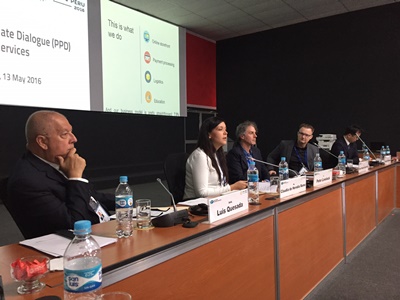 The 5th Public-Private Dialogue on Services was co-organized by the 2016 APEC SOM (Senior Officials' Meeting) Chair's Office of Peru and PECC as follow-up from previous meetings held in Surabaya, Clark, Boracay, and Cebu.
The 5th Public-Private Dialogue on Services was co-organized by the 2016 APEC SOM (Senior Officials' Meeting) Chair's Office of Peru and PECC as follow-up from previous meetings held in Surabaya, Clark, Boracay, and Cebu.
Given the dominant role of services in GDP and employment in all APEC economies, raising productivity growth, alleviating poverty, and impvoing inclusivity of women and MSMEs (micro, small and medium enterprises), APEC Services Cooperation Framework was adopted by the Leaders in November 2015. The dominant role of services in FDI flows stands in comparison with a traditional under-performance in trade terms, reflected also in a below global average services value added content in gross APEC exports.
In the 2015 APEC Leaders' Declaration (Annex B), the Leaders recognized "the rapid changes taking place in the delivery of services, such as through digitally-enabled trade. To boost services trade and investments in the region, APEC needs to further deepen and build momentum in its work on services."
"We have explored ways to further deepen cross-fora collaboration on services such as through the first joint meeting of the Economic Committee, the Group on Services, and the Pacific Economic Cooperation Council (PECC) on Regulatory Reform and Services held in 2015. The Public-Private Dialogues on Services, initiated by Indonesia in 2013, were undertaken in cooperation with the APEC Business Advisory Council (ABAC) and PECC, to broaden the base for consultation. These dialogues stressed the value of intensified focus on services and facilitated the sharing of regulatory experiences and challenges, as well as generated views on ways to improve services competitiveness taking into account APEC economies’ circumstances."
The ongoing series of PPDs aim to prepare the ground for the new APEC Services Competitiveness Roadmap, to question and review the current state of play of the services sector as well as establish an empirical base for an appropriate regional strategy. The discussions at the 5th PPD on services focused mainly on three inter-related issues:
1) knowledge economy infrastructure (including the stock of human capital and the educational and training needs associated with a shift into services);
2) innovation and the potential for services technologies to change our economies, indeed to change our lives, and the role of structural change and regulatory review-reform; and
3) greater openness to trade and investment, at the border and behind the border.
Without a collective action plan, inter-connectivity and inter-operability will remain inadequate and we will be missing out on the unprecedented growth opportunities that new technologies are able to bring. Some of the important and urgent issues are having to reduce regulatory compliance costs on firms and improving efficiency by removing opaqueness, duplication, overlap and inconsistency in services regulatory regimes. At present, compliance costs disproportionately impact on smaller firms with disadvantages in resources. What needs to happen is that regulation in services need to move from a risk management-oriented approach to a more business enabling mindset. The perennial importance of enhancing trade and investment at the border, to flows of goods, services, capital, people, ideas, and data was also highlited at the PPD held in Arequipa in conjunction with the APEC trade ministerial meeting.
A summary report can be downloaded here.
